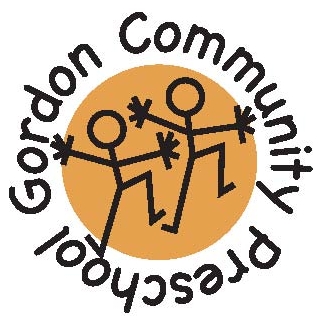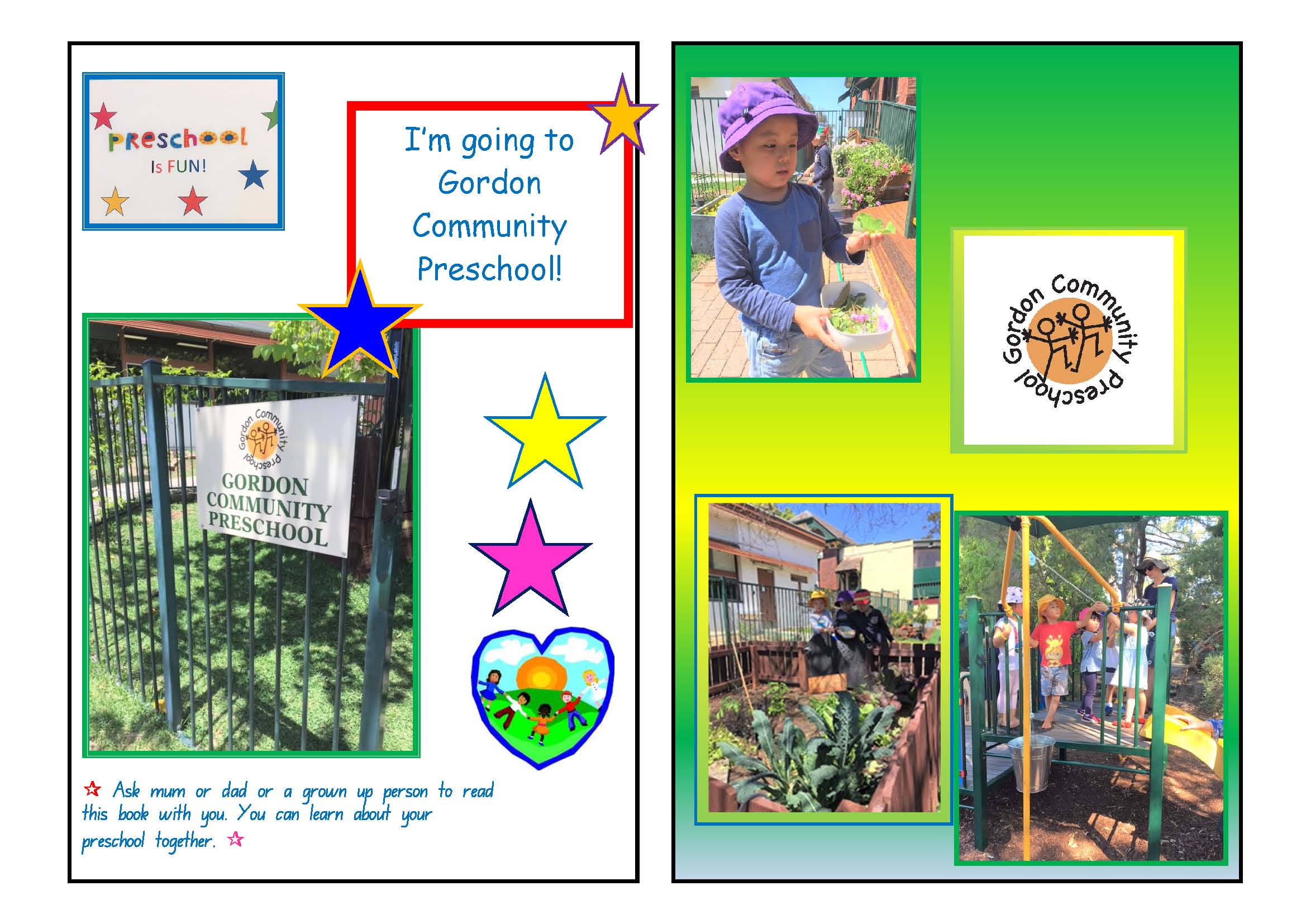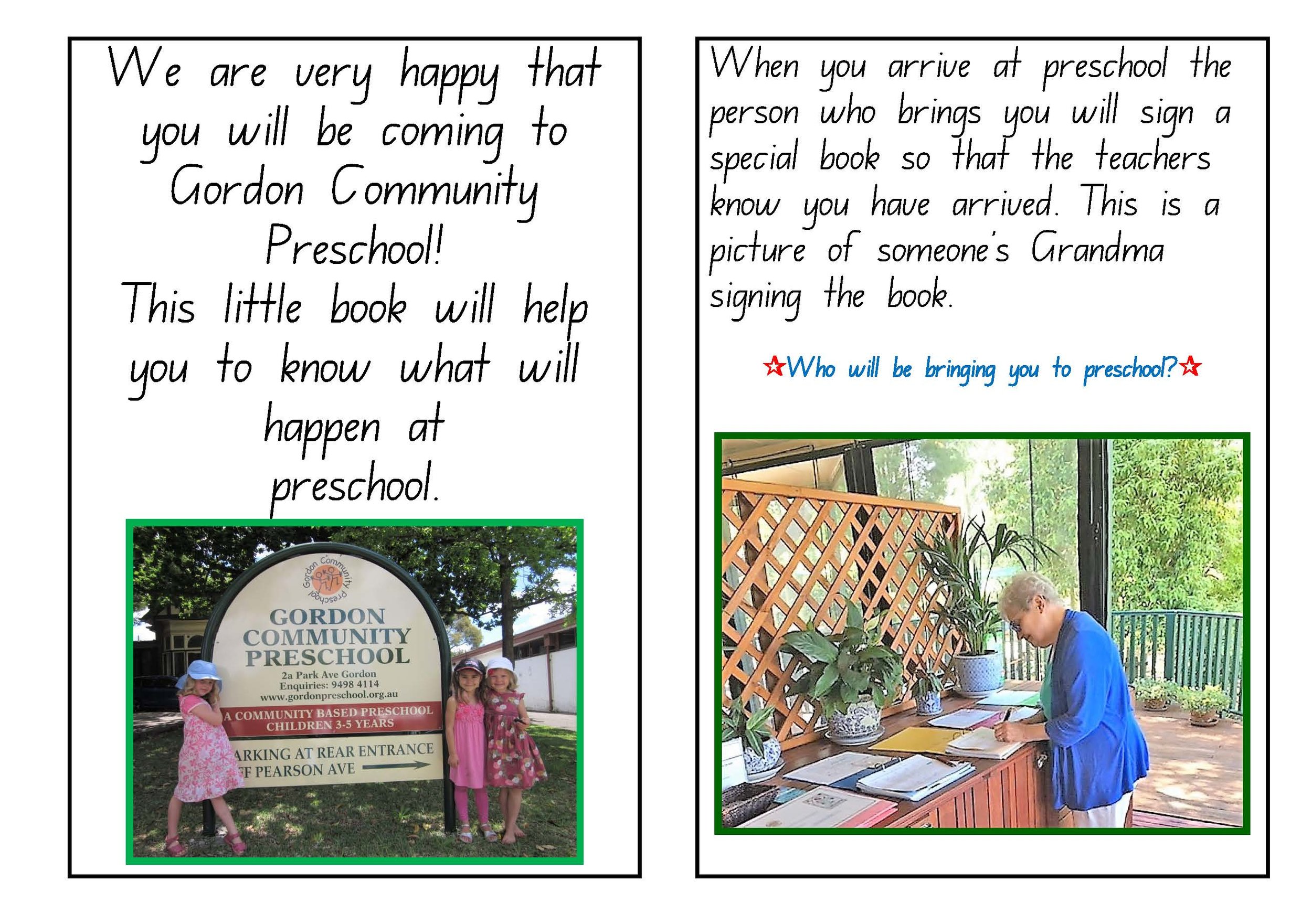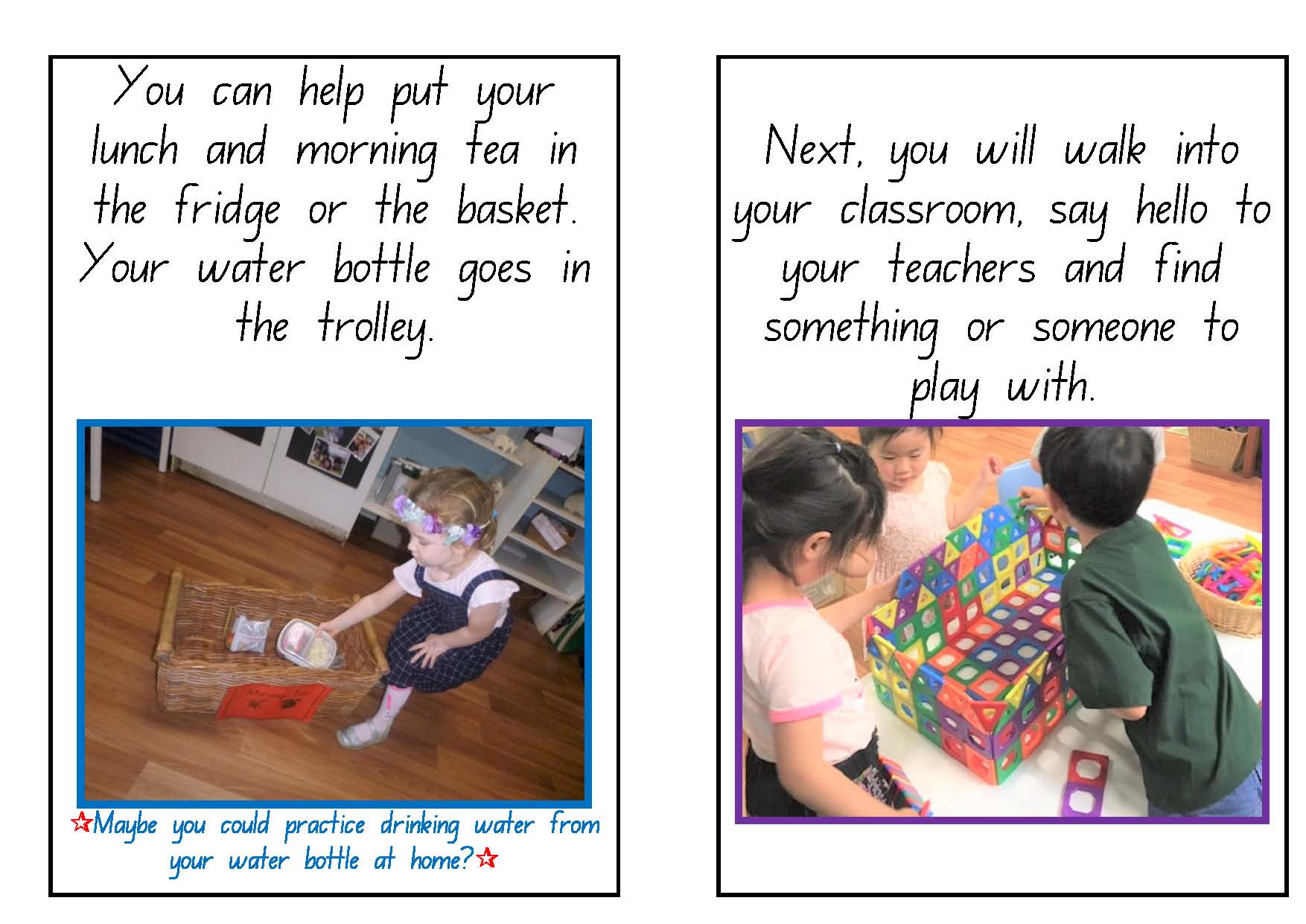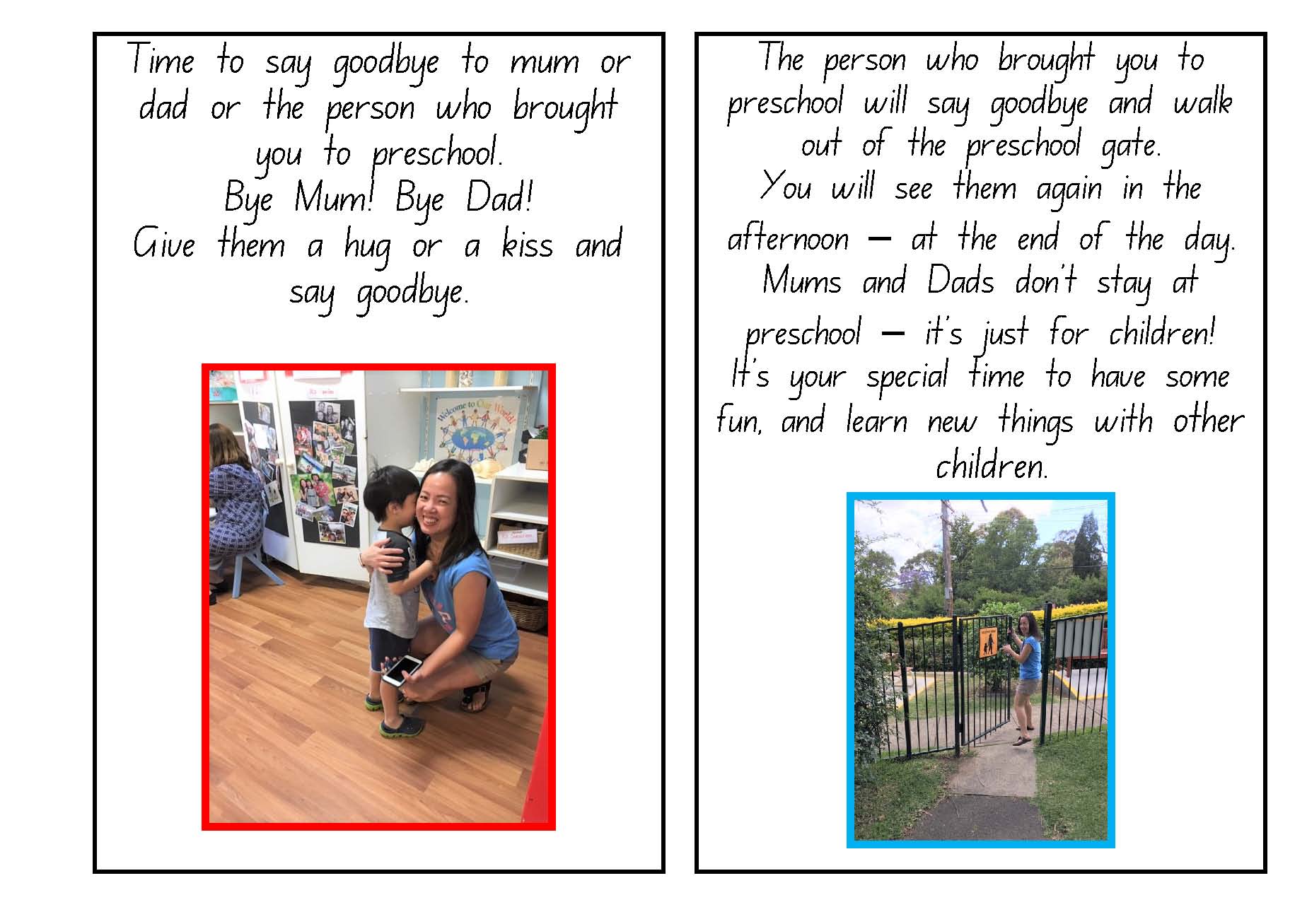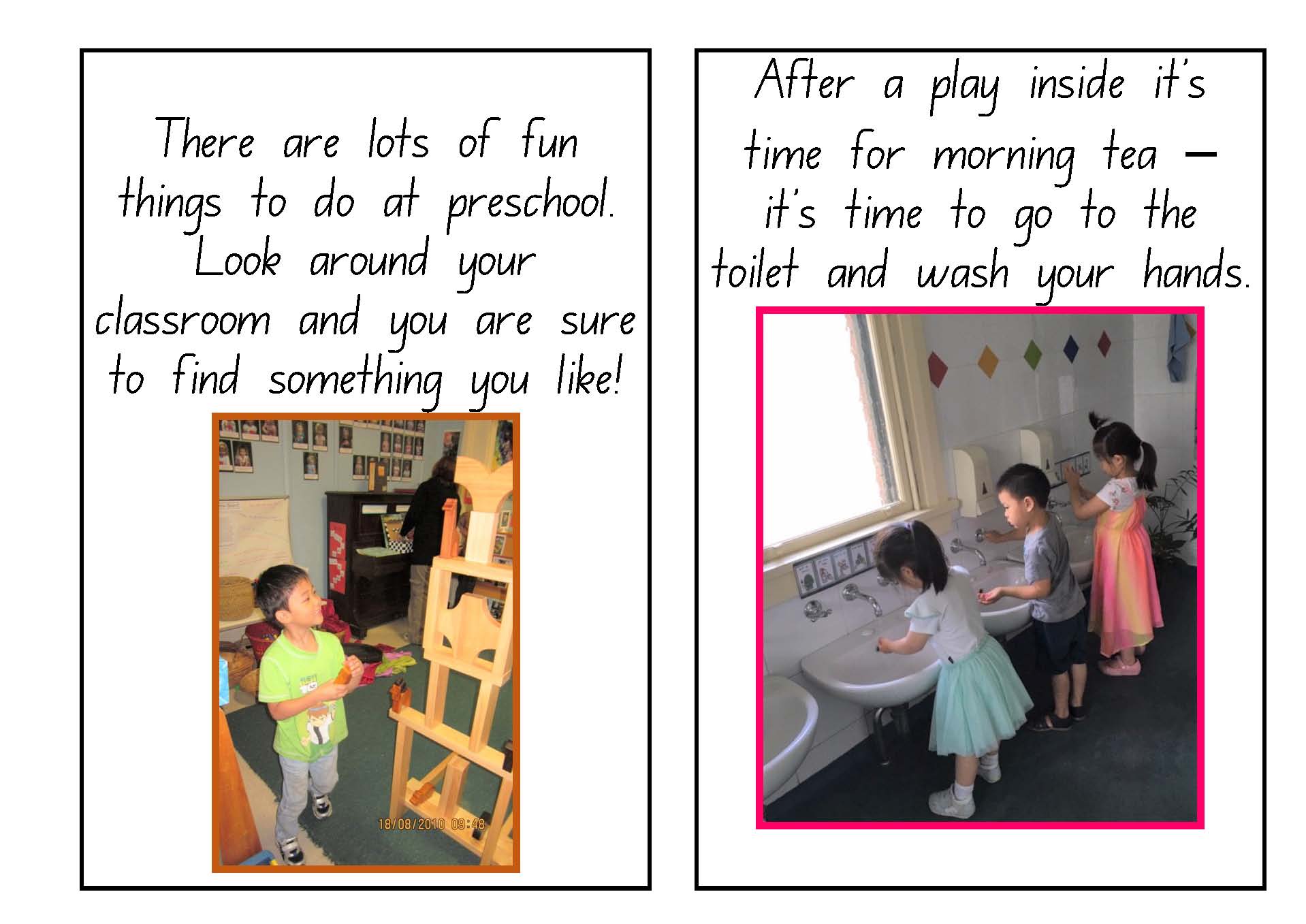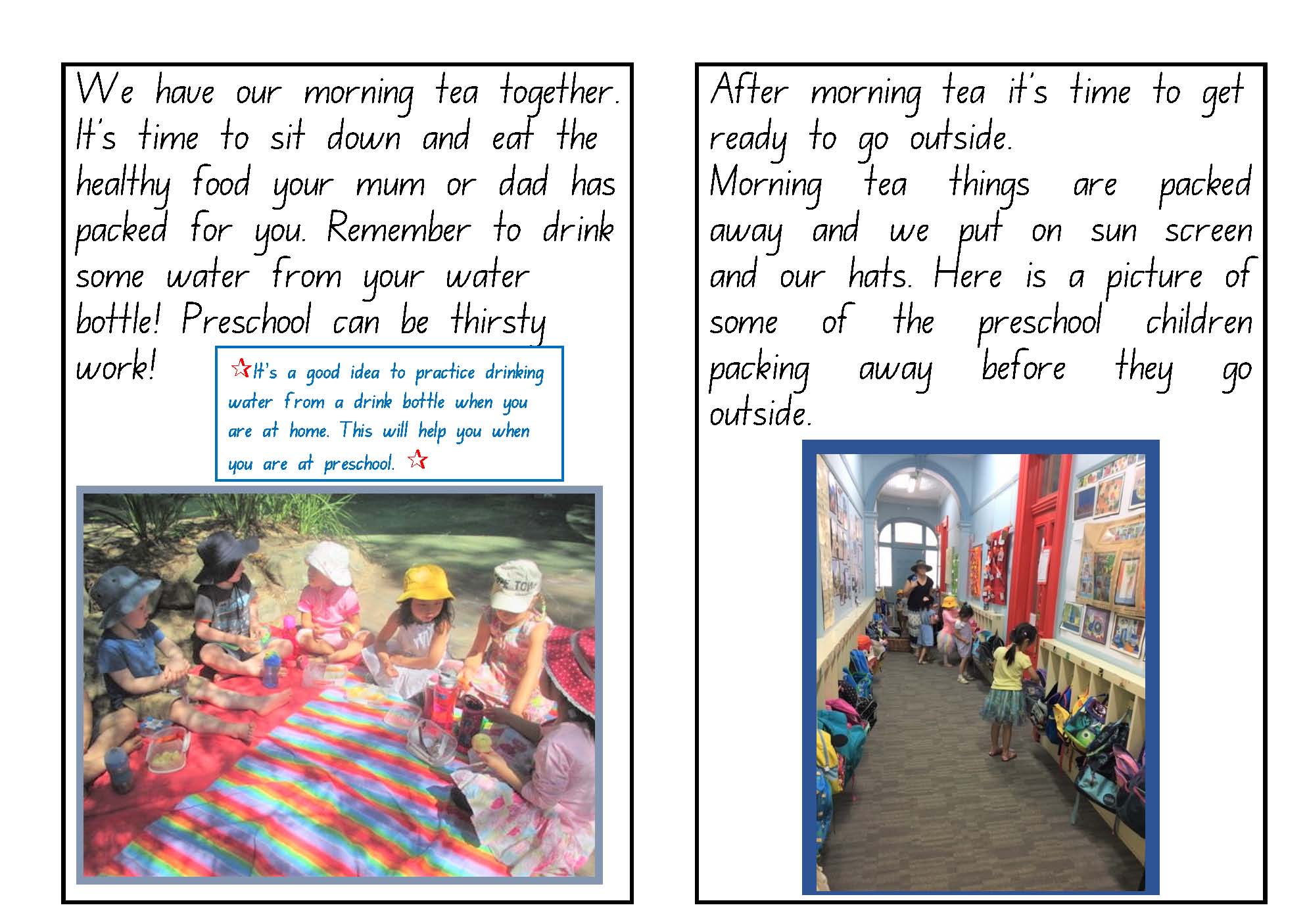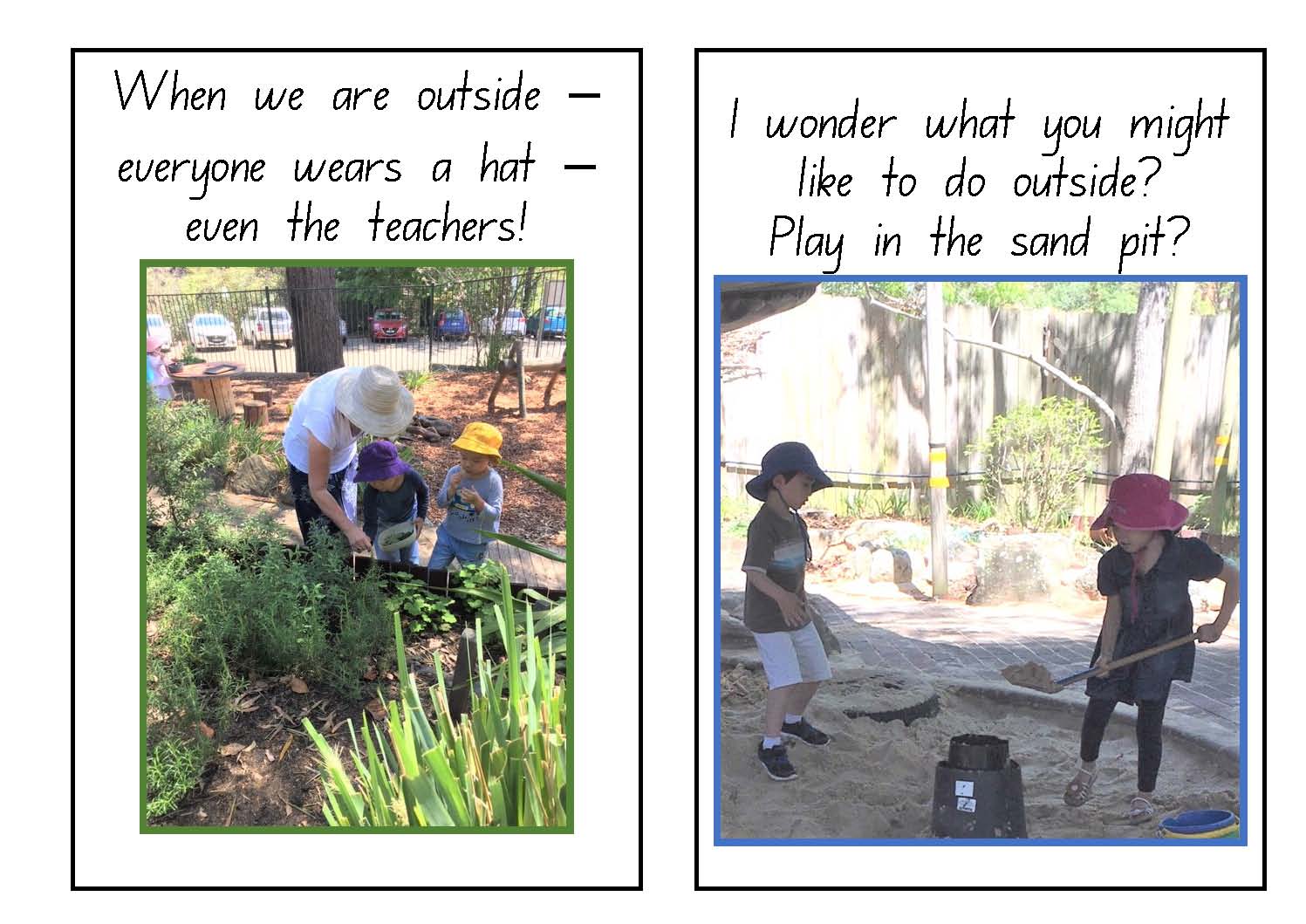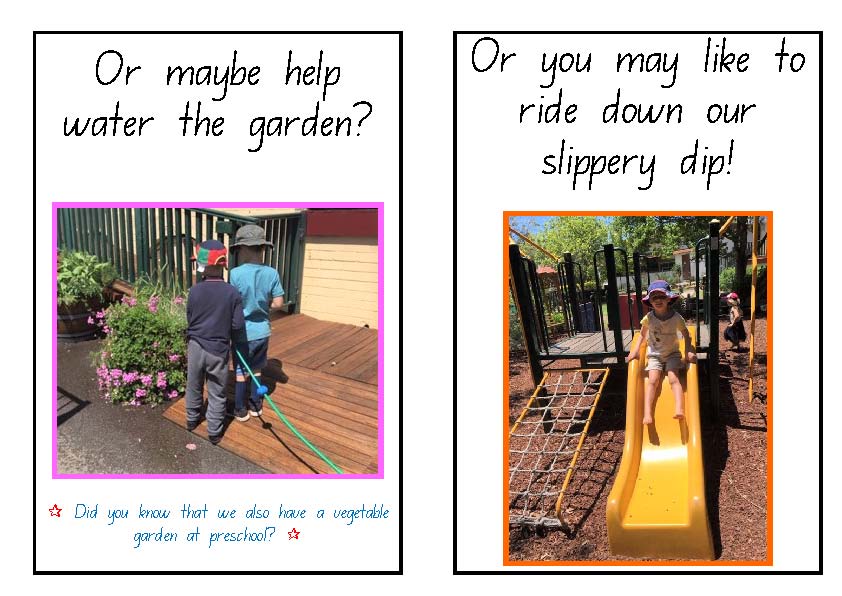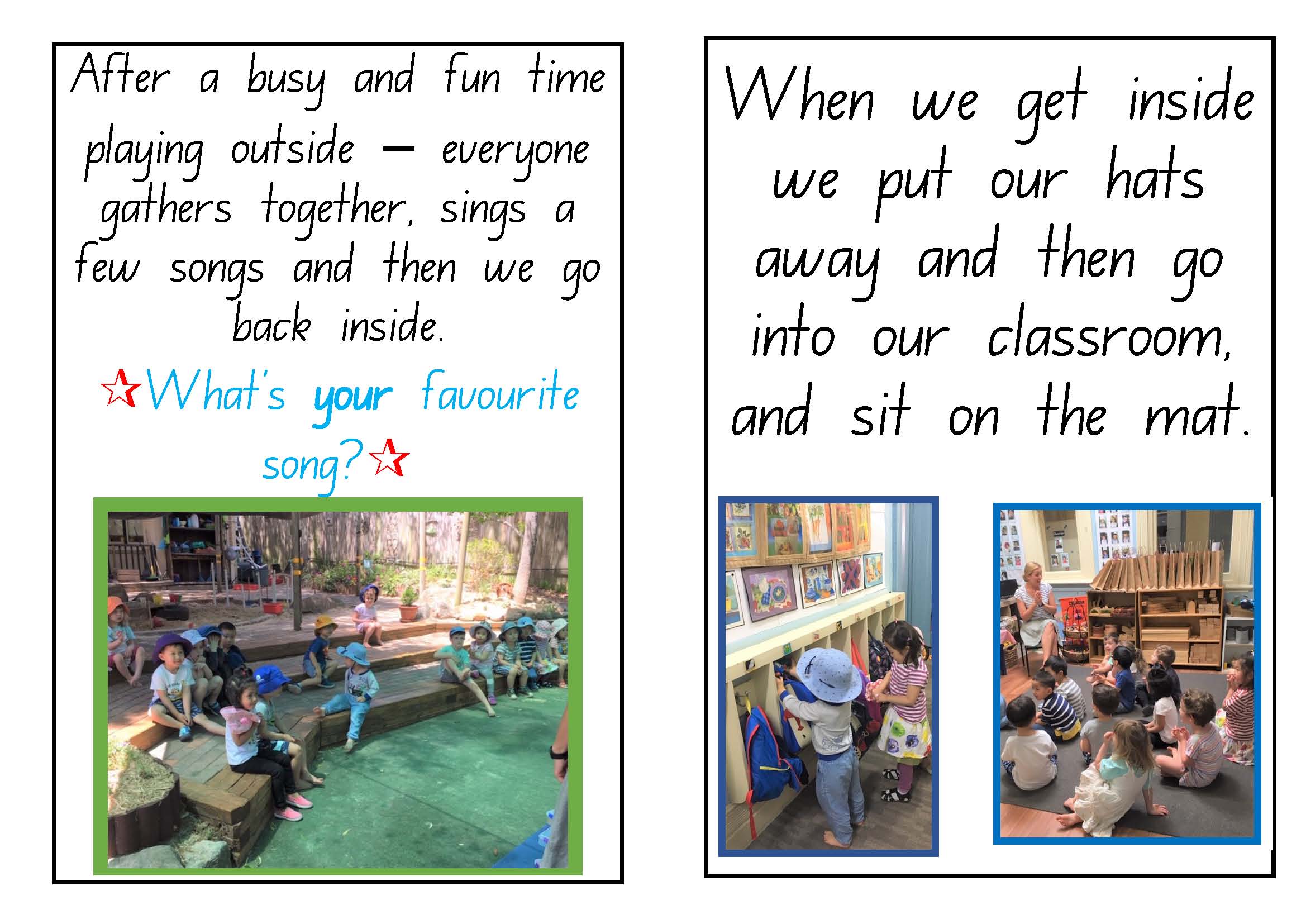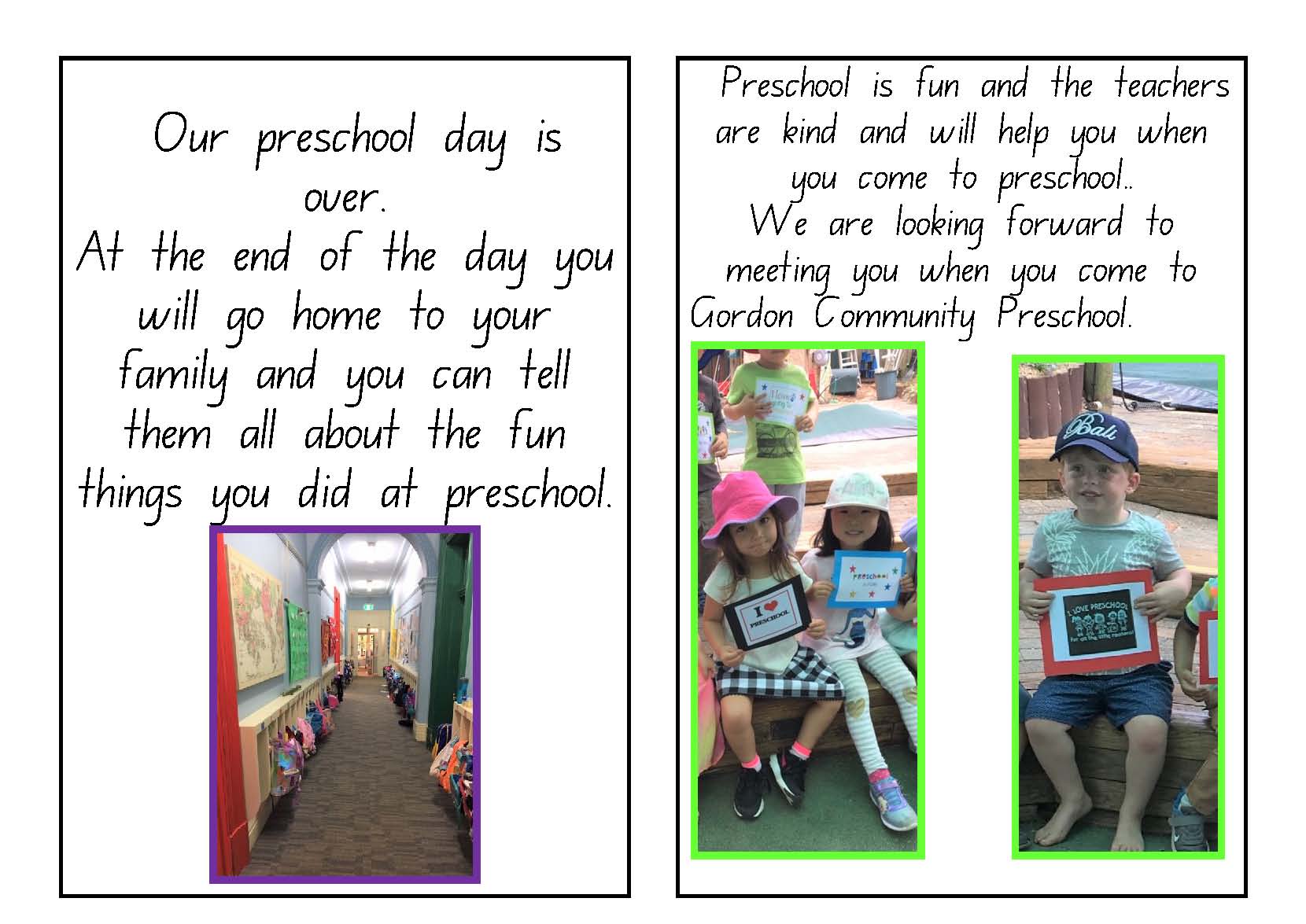
What should my child bring to preschool?
A good sized school bag. This needs to be big enough to hold a lunch box, morning tea container, drink bottle and art work. Please assist your child in learning to independently open and close his/her school bag.
Children are required to bring a hat throughout the year.
A complete set of spare clothes. Children may become wet during water play. (It may be a good idea to leave an old set of clothes permanently in your child’s bag).
If your child usually has a sleep during the day please speak with your child’s teacher about whether or not it will be necessary to bring in a sheet set.
Separately packed morning tea, lunch and a drink (water in a drink bottle - clearly marked with your child’s name). Please refer to a copy of the preschool nutrition policy.
Can my child bring toys from home?
Bringing toys from home is not encouraged as they are often lost or broken at preschool and can sometimes end up being a distraction for your child and others in the class. However, in the settling in process we encourage you to bring a soft toy as a comforter if you feel this would be of assistance to your child.
Do you teach the children to read?
What is your approach to literacy and numeracy?
We do not adopt a formal or “direct instruction” approach to literacy and numeracy learning. Current early childhood pedagogy emphasizes a natural unfolding of skills – and an emergent approach to supporting children’s development in these areas.
When we think of “literacy”, we typically think of reading and writing. There is, however a broader view of literacy that encompasses a wide range of communication modalities including music, movement, dance, story telling, visual arts, media and drama – as well as talking, listening, viewing, reading and writing.
A typical preschool day sees children involved in many of these types of experiences.
We also aim to give children opportunities to engage with many different types of texts, that is print based texts such as books, magazines, restaurant menus, posters, labels, name cards or screen based such as educational computer games, looking up information using search engines or a slide show on the computer at the end of the day.
We read a lot of stories, sing songs and nursery rhymes and engage in activities such as clapping the beats in our name, listening out for words that rhyme and predicting what might happen next in a story. As children draw or make patterns using paint, blocks or river stones, they are also thinking about shape and form. They are planning and predicting. They are expressing an idea or a thought. All of these skills are fundamental to successful future reading and writing.
Similarly, there are a number of preschool experiences which support early numeracy development. Pouring, measuring, block building, completing puzzles, sorting, threading, learning about space, size, shape and counting are all embedded within the every day programme.
Our goal is to help children develop a love for books, an interest in the way things work, an enthusiasm for mathematical concepts and problem solving and a desire and a passion for learning. It is important not to “race children ahead” by presenting a formal approach to the teaching of reading and numeracy, which children may not be ready for and which ultimately may lead to children who begin to associate reading or numeracy with failure, rather than with optimism, joy and success.
Our approach is supported by many of the local infants/primary schools who concur that it is important for the foundations of literacy and numeracy learning to be solid and secure before these foundations are built upon.
You can find more information about early childhood literacy here.
How do you prepare children for school?
Gordon Community Preschool aims to prepare children for school and for life. The preschool places an emphasis on acknowledging children in the “here and now” and not always in the light of the next setting. We believe that the most important skills in ensuring a successful transition to school are in the areas of social and emotional development.
The transition to school is supported in a number of ways. Experiences are planned to provide opportunities for children to:
Develop independence
Develop problem solving capabilities
To begin to look after their own belongings
To approach adults with confidence
To maintain concentration on specific activities
To sit, listen and participate within a group
To develop pro-social skills. For example, resolving conflicts with peers, waiting their turn, sharing, assisting peers when required
The preschool programme is designed to foster the skills and independence required for school and school is discussed and promoted in a positive manner.
To further facilitate transition to school:
Developmental records can be made available to prospective schools with parental permission.
Information about local schools and their open days is made available to parents
The preschool hosts a “Transition to school evening” in third term every second year.
A “buddies” programme is implemented each year in fourth term for our 3 day group – this programme helps children to get to know other children who may be heading off to the same school the following year and has a focus on developing social skills as well as skills in listening, turn taking, and following directions.
The Director and teachers are available to discuss any concerns or questions about the transition to school.
What local schools do children from Gordon Community Preschool feed into?
Our preschool children head off to a number of different schools - sometimes up to about 20 different schools! There’s a real mixture ... Gordon East, Gordon West, West Pymble, Killara, PLC, Newington, St Ives Primary, Pymble Public, Holy Family ... the list is substantial!
What is your approach to Sun safety?
Children have the opportunity to play outdoors each day in our beautiful playground. The playground has a number of shade providing trees as well as shade structures. All children and teachers wear a hat while outdoors and are encouraged to wear clothing that covers the shoulders. During the warmer months, October to March, sunscreen needs to be applied if children are outside for any period of time. Each child is supplied with their own roll-on sunscreen and parents can assist their child to apply it upon arrival in the morning, particularly if their child is starting the day outside. If children are starting inside, the staff will assist the children to apply sunscreen 20 minutes before going outside later in the morning. During the cooler months, April to September (excluding June and July) parents should still apply sunscreen on arrival if their child is starting outside. The classes who start inside will check the SunSmart UV Alert for the UV forecast before going outside and will only apply sunscreen if the rating is 3 or above. During June and July the UV Index is mostly below 3 therefore sunscreen is not required however the children should continue to wear a hat or beanie while playing outside.
Please note: If your child has skin sensitivities, our team will apply whatever sunscreen you provide.
Do children have to be toilet trained before they come to Preschool?
All children develop at different rates and we don’t want to place unnecessary pressure on children and families to be toilet trained before they arrive at preschool. So - please don’t panic!
It will, however help your child if he/she is as prepared as possible for using the toilets at preschool. Upon enrolment, talk with the teachers if you have concerns about your child’s toileting.
My child has additional needs - can he/she come to Gordon Community Preschool?
Yes. Gordon Community Preschool supports a philosophy of inclusion. We employ additional staff when required to increase the ratio of adults to children. Please telephone the preschool to talk with us about how we might support you and your child.
What is your policy on discipline?
We adopt a positive approach to the management and guidance of behaviours. We believe that prevention is better than intervention and aim to provide an environment which maintains the interest and engagement of children by being well resourced and thoughtfully and intentionally provisioned for. We set appropriate limits and encourage children to use their words to resolve problems. We aim to keep the consequences of behaviour closely linked to the behaviour. We do not make children apologise or “say sorry” to others, preferring to place the emphasis on helping children to think about the effect of their behaviour on others, helping children develop a sense of empathy and to think of alternative positive solutions to resolving problems. If two children are involved in a conflict, we approach each child with care and concern – aiming to help each party find ways to articulate how they are feeling and to support children in developing positive strategies which may be applied to future situations. We work collaboratively with families in our approach to the management of behaviour. We place a value on fairness and equity and are upfront about exploring concepts such as inclusion and exclusion with the children.
Will you teach my child to speak English?
We have a number of children attending Gordon Community Preschool whose first language is not English. We understand that many families are worried and concerned about their child learning English during their time at preschool. Some of our preschool parents and grandparents have experienced first hand the challenges of socialising and communicating in a language that is not familiar to them – and understandably they do not want their child or grandchild to experience the same difficulties.
Learning through play is best
We want to reassure families that simply being at preschool and playing with other children is one of the best ways for your preschool child to learn English. While we do not teach children English in a formal sense, there are many opportunities as we sing songs, learn simple rhymes, read stories for children to be exposed to and practice English. As children play with each other at preschool they have the opportunity to listen to and explore the use of English. This is far more valuable and meaningful than a formal or instructional approach to English language learning. In fact, there is evidence to support this. If children are engaged and interested – learning is optimised. Play is usually more enjoyable for children than more structured formalised lessons.
Maintain the home language!
It is important for families to continue to speak with children in your home language – the best way for children to learn a second language is through expertise in the first. Please do not worry if your child gravitates towards another child who speaks the same language. It will assist your child in settling in as well as his/her learning if your child has the opportunity to use his/her home language while at preschool. In fact, we welcome parents and family members who speak a second language to come in and share it with us. We love learning songs and rhymes in other languages!
Learn some key words
Before your child begins preschool and during the first few weeks it will help if you teach your child a few key words in English such as “drink” “toilet” “please help”. It will also help our staff team if you teach us a few key words in your home language.
Talk with your child's teachers
Please speak with us if you have any concerns about how we might further assist you and your child. If you would rather write your questions down in your home language, please do so – and we can arrange to have them translated.
More tips on helping children to learn English as a second language
How do you help new children transition to preschool for the first time?
There are many different ways we can encourage a smooth transition into preschool, particularly for children who are feeling anxious or those who have never been to an educational setting before.
One of the most valuable ways is by reading our booklet ‘I’m going to Gordon Community Preschool!’ at home with your child prior to starting and also during the first term as they begin to feel familiar with the preschool.
